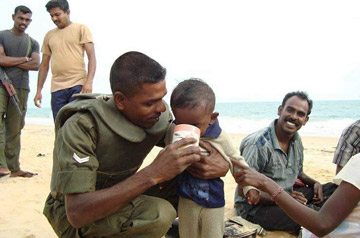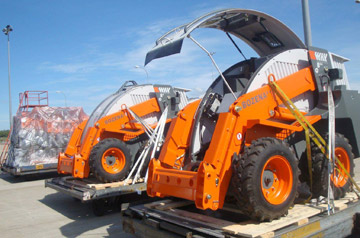|
Opinion:
Lankans must unite to face international challenges
By K.M.H.C.B. Kulatunga
The LTTE rump and certain quarters in the West seem to have
sacrificed their seasonal holidays to work overtime as they use all
their might to strength their campaigns against Sri Lanka in the coming
year.
 |
|
A soldier feeding a
child. (File photo) |
With less than three months away from the next UN Human Rights
Commission (UNHRC) in Geneva in March next year, these sinister elements
are working round the clock to mislead the international community and
attempt to take Sri Lanka before an international war crimes tribunal.
The best way to face these international challenges is to unite all
Sri Lankans under one banner. Whatever the differences or problems we
have politically, those scores should be within ourselves without
leaving any room for foreign forces to pork their fingers.
President Mahinda Rajapaksa, in his concluding speech of the budget
debate on Friday appealed Tamil National Alliance (TNA) leader R.
Sampanthan and his party's Northern Provincial Council Chief Minister
C.V. Wigneswaran to co-operate with the government to evolve homegrown
solutions to bring about national reconciliation, peace and development
in the country.
The President wound up the budget debate that lasted from November
21, by delivering a prepared speech for one hour to a well-attended
Parliament.
Constructive criticism
The President, in his timely speech, countered criticism on the
budgetary proposals by opposition members. However, there was an element
of constructive criticism and recognition of his government's
achievements by the opposition this time.
"We commend this. You have to criticise us constructively. Then, we
can correct ourselves. UNP MP Dr. Harsha de Silva recognised the
government's ability to reduce the budget deficit to 5.8 percent from
9.9 percent.
We target to reduce it further to 5.2 percent next year and to 3.8 in
2016," the President had said.
Similar to his last year's budget speech, the President drew examples
from the folklore woven around a villager who took a sack of tamarind to
a vendor.
"In this story, the vendor concerned weighed the amount of tamarind
and deducted payments for husks, seeds and the sack that contained it.
Then, there was none left. The disappointed villager asked the vendor
whether this meant there was no tamarind in the sack. The opposition's
criticism cannot be compared to this story this time. They have admitted
that there is some tamarind in the sack," he told the House amid ripples
of laughter.
The President tried to counter criticisms mainly by UNP MPs such as
Sujeewa Senasinghe, Ajith P. Perera and Sajith Premadasa in their
speeches during the course of the debate. He said state institutions
were considered unsuccessful business ventures both by successive
governments between 1977 and 2005.
Policy deviation
As the President pointed out, State institutions had been privatised
at a rate. Late UNP leaders J.R. Jayewardene and R. Premadasa built the
opinion that governments should do away with them. The same policy was
followed by former President Chandrika Kumaratunga and opposition leader
Ranil Wickremesinghe. But the country has deviated from that since
President Rajapaksa first assumed office in November 2005.
Without criticising every move of the Government, the UNP, TNA and
the JVP should look at the achievements of the Government with a
positive mind.
Referring to the mega water project aimed at supplying drinking water
from the Iranamadu Tank to Kilinochchi and Jaffna, the has urged TNA MP
S. Sritharan who is from that area, to assist the government to address
problems cropped up in the implementation of this project.
 |
|
Modern equipment used
for demining in the North. |
He outlined the government's development projects such as road
projects, port projects and the airport project. "I kindly request the
UNP not to think of privatizing the Hambantota port and the airport at
any cost," he said.
The President's observations are food for thought. If the Opposition
does not provide ammunition to the sinister elements in the West, the
international community could do nothing against Sri Lanka. Hence, it is
important that the political parties in the Opposition act in a
responsible manner to beat the common enemy.
The TNA has a big role to play in meeting the aspirations of the
Tamils living in the North and the East. They must understand that the
expectations of Tamils in the two provinces are different from their
fellow Tamils in Colombo or the Tamil Diaspora in the West.
Work with Government
It seems that the TNA has taken over from where the LTTE had left to
please the Tamil Diaspora, completely ignoring the aspirations of the
Tamils in the North and the East who had voted for them.
In this scenario, Wigneswaran has a greater role to play and should
act like a moderate Tamil politicians who is only interested in the
well-being of the people in the North. Tamils in the North never voted
for Wigneswaran to spread the separatist agenda and push back to the
people in the North to those dark days again.
Hence, Wigneswaran should ignore separatist ideology by some of his
colleagues and concentrate on the well-being of the people in the North.
In order to achieve that, the Chief Minister of the North should work
closely with the Government and its representative in the North - the
Governor. If the TNA goes on fighting over petty issues, they would
never get a chance of developing the province or helping their own
community. If that happens, Tamils in the North could lose the
facilities that had been offered by the Government prior to the
establishment of the Northern Provincial Council.
If the TNA is sincerely interested in the well-being of the Tamils in
the North and the development of the Northern Province, they should work
hand in hand with the Government. There is no point in playing a crybaby
role by running to India and the West from time to time.
As the President had told before, no foreigner could have a greater
pain on people in Sri Lanka other than the country's leaders. Hence, the
TNA should desist from making overseas tours to discredit the country
and settle their scores within the democratic framework of the country's
political system.
Controversial statements
But all those should be in keeping with the Constitution of the
country. We have seen a few TNA MPs and Provincial Council members
making controversial statements to please the LTTE rump and the Tamil
Diaspora.
Stern legal action should be taken against them under the prevention
of terrorism act (PTA) or breaching the clauses of the Constitution.
Moderate peace-loving Tamils in the North would never approve those
acts. Instead of looking ways and means to tame Sri Lanka for its
legitimate battle against terrorism, the international community should
have a closer look at the positive developments hare and the peace
enjoyed by one and all after the eradication of LTTE terror.
Despite contending with one of the most ruthless terrorist groups in
the world, the 2004 tsunami and the global food, energy and financial
crises, Sri Lanka's attaining the MDGs is salutary. Statistics speak for
themselves. Sri Lanka was ranked 92nd out of 187 countries in the Human
Development Index in 2012. Absolute poverty in Sri Lanka declined to
6.5% in 2012 from 15.2%, over a period of five years, surpassing the MDG
mid-term target.
The goal of universal primary education will be easily achieved by
2015. The key dividend from this strong educational infrastructure has
been a drastic reduction in the unemployment level. Sri Lanka's
accomplishments in healthcare include the infant mortality rate of 9.4
per 1,000 live births, highlighted by UNICEF as a success story.
The international community should at least at this late stage,
should stop harping on human rights of the LTTE terrorists killed in
action. They could never be considered ordinary civilians.
True that they would have been in civilian attire but they had been
terrorists who had been fighting with a legitimate army of a sovereign
state. The UN should not expect Sri Lanka and US to act in two different
ways when battling against terrorism.
As President Rajapaksa had once pointed out, there are no good
terrorists and bad terrorists. Terrorism in any part of the globe brings
nothing but agony and disaster to human lives. Hence, terrorism in all
parts of the world should be eradicated in similar fashion.
We do not question the acts of the US or the NATO forces in their
battle against terrorism. They have committed greater human rights
violations than any other country. But they go scot free with a simple
apology - 'sorry'! In contrast, these self same countries try to take
Sri Lanka to task for violating 'human rights' of the LTTE terrorists -
killed in the battlefield.
The UN which had acted a toothless tiger against the human right
violations by the US-led NATO forces in Iraq and Afghanistan and US
drone attacks in Pakistan that have killed hundreds of civilians, flex
its muscle when it comes to Sri Lanka's legitimate battle against
terrorism. This is typical Western hypocrisy.
The UN cannot treat the identical topic two member countries on two
different viewpoints.
All those who point an accusing finger on Sri Lanka should think
twice before airing their views at the next UNHRC sessions.
They should not get carried ways by what David Cameron or Navi Pillay
says. They must evaluate the true ground situation in Sri Lanka.
|

